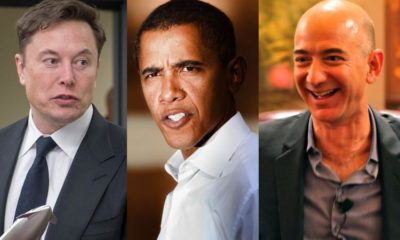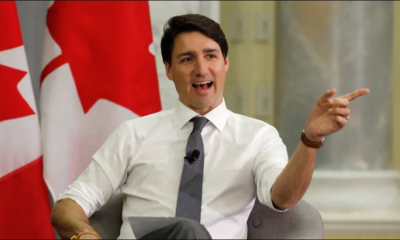World
Obama gives touching speech at funeral of Biden’s son

Washington: US President Barack Obama delivered a heartfelt eulogy at the deeply emotional funeral of Beau Biden, son of Vice President Joe Biden, who died a week ago of brain cancer. He was 46.
About 1,000 people gathered on Saturday at St. Anthony of Padua Catholic Church in Wilmington, Delaware, to pay their last respects to Beau Biden, among them some of America’s leading political figures, Efe news agency reported.
Obama said that Beau Biden, who suffered when only three years old from the death of his mother and sister in a car accident, chose not to withdraw into his pain but instead to “live a life of meaning”.
He would live a life for others” and brought his “mighty heart” to his work and to his family while making “a difference in the lives of all he touched”.
“The world noticed. They felt it, his presence. Beau lives on in the lives of others,” Obama said, visibly moved as he delivered a long eulogy.
Beau, whose baptismal name was Joseph R. Biden III, was the eldest son of the vice president and was attorney general of the state of Delaware for two terms. He was married and had two children.
Obama attributed part of Beau’s character to “just how much he loved and admired his dad”, who taught him “that he was no higher than anybody else, and no lower than anybody else”, because “everybody matters”.
“I think Joe would be the first to acknowledge that Beau was an upgrade — Joe 2.0.,” Obama said and everyone laughed, but added that he was “a scion of an incredible family who brushed away the possibility of privilege for the harder, better reward of earning his own way… fair and square”.
Obama said that he and his wife Michelle and their daughters Sasha and Malia feel like “we’ve become part of the Biden clan”.
“We’re honorary members now,” and referred to the vice president as “my brother”.
Obama’s eulogy was preceded by another speech by Army Chief of Staff Raymond Odierno, who posthumously awarded Beau Biden a military honour, the Legion of Merit, for his career in uniform and his service in Iraq.
Also voicing their feelings were Beau’s two siblings, Hunter and Ashley, the first from the vice president’s first marriage and the latter from his current marriage with Jill Biden.
Beau “was our protector, our mediator, the captain of our lives”, Ashley Biden said. “Being with family was Beau’s favorite pastime… He always wanted us around and we always wanted to be around him.”
Hunter Biden recalled how on the day as a child when his mother and sister were killed, Beau held his hand and said “I love you, I love you,” and how on his deathbed he returned the favour. “I held his hand, and he took his last breath.”
The funeral was the first time that a president or vice president of the US has had to bury a son or daughter while still in office since 1963, when then president John F. Kennedy’s son Patrick died two days after his premature birth.
The vice president did not speak at the funeral and stayed constantly with Beau’s widow Hallie, his grandchildren Natalie and Hunter, and the rest of the Biden family, who have had three days of solemn ceremonies in Delaware to bid their final farewell to the deceased.
The singer of the British group Coldplay, Chris Martin, sang “‘Till Kingdom Come” during the funeral, something he offered to do after learning through a friend that Beau Biden liked his band’s music, the White House said.
Among those attending the funeral were ex-president Bill Clinton (1993-2001) and his wife, former secretary of state and presidential hopeful, Hillary Clinton, as well as a dozen members of Congress, a large part of Obama’s cabinet and the US Ambassador to Japan, Caroline Kennedy.
World
Lockdowns in China Force Urban Communities to Defy Censorship and Vent Frustration Online

Shanghai’s rich middle class is leading a wave of online dissent over the strict and prolonged lockdowns imposed in various parts of the country. Chinese internet censorship is struggling as patience is wearing thin in many urban centers, coming up with creative forms of online protests.
Social Media Posts Revealing Lockdown Tension in Shanghai
Drawn-out lockdowns are nothing new in China as authorities insist with the nation’s zero-Covid policy since the start of the pandemic. Currently over This time around, however, metropolitan areas like Shanghai are increasingly difficult to keep quiet, given that its more than 25 million residents have seen weeks of total isolation along with food shortages and many other service interruptions.
Dozens of towns and reportedly over 300 million Chinese citizens have been affected by lockdowns of different severity. As expected, urban netizens have been most outspoken over their difficulties by finding creative ways to get around state censorship and bans placed on topics, news comments and spontaneous campaigns.
Shanghai residents have been using mobile proxies and hijacking seemingly unrelated hashtags to talk about healthcare issues, delivery failures and the overall severity of their situation. The “positive energy” that the Chinese government wants to transmit during the recent prolonged series of lockdowns does not come naturally to those counting food supplies and online censors are working hard to filter words, trending topics and undesired social media sharing.
WeChat groups and message threads are under constant monitoring. Posts questioning the zero-Covid approach have been quickly deleted, including by leading Chinese health experts like Dr. Zhong Nanshan. Video footage is soon censored and protests and investigations are quickly made to disappear.
Where this has not worked, officials have exposed banners with warnings and outright threats like “watch your own mouth or face punishment”, while drones have been patrolling the city skies. Yet, if anything, this has led to further tensions and unspoken confrontation with Shanghai’s educated and affluent middle class.
Creative Online Solutions Harnessing Civic Energy
Announcements by Chinese social media that they would be publishing the IP addresses of users who “spread rumors” have not helped either. Tech industry research has shown that much of Asia’s tech-savvy population has a habit of using mobile proxies and other privacy tools, quickly finding workarounds to browse the internet freely and talk to the world about the hottest topics.
The sheer volume of forbidden posts is already a challenge for the very censorship system, experts explain. Unable to track all trending hashtags, state workers overlook topics that speak about the US, Ukraine or other popular news. Linking human rights elsewhere to their situation, Chinese online dissidents establish their informal channels and “hijack” the conversation to share personal or publicly relevant information about the Covid suppression in their town.
Sarcastic and satirical posts still dominate. Others hope to evade the censors by replacing words from famous poems or the national anthem. One thing is certain – social media, when harnessed with the right creativity, has proven its ability to mount pressure on the government in even some of the most strictly controlled tech environments like China.























